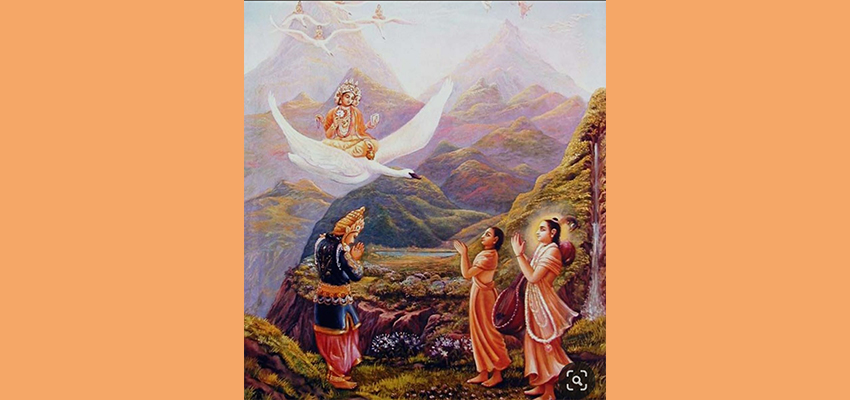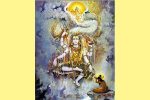NAME 17
Akṣaraḥ अक्षरः
The imperishable. The Brahman is imperishable and He alone is imperishable. The whole universe is made up of kṣaraḥक्षरःAkṣaraḥअक्षरः or perishables and the imperishable. This nāma is not merely an endorsement of the previous nāma, but also affirms that there is no difference between Kṣetrajña, the individual soul and Akṣara, the Brahman.
Kṣetrajña means the individual soul and Akṣara means the Supreme Self, the Brahman. In reality, there is no difference between the two.
१७. ||ॐ अक्षराय नमः||
17. Om Akṣaraya Namah
Aksharah -lndestructible: things which are finite are necessarily conditioned by time and space; the Infinite is unconditioned, and so It is Aksharah. Since It is Indestructible, It cannot come under the methods of universal destruction arising from nature or through the wilful actions of man. “It cannot be cleaved by instruments of destruction, nor can fire burn It, nor water drench It, nor air dry It”-(Geeta Ch. 2, St. 23). It is also indicated that the Supreme Brahman is the Akshara-“Aksharam Brahma Paramam” -(Geeta Ch. 8, St. 3).
Please note that in the stanza there is the extra word ‘only’ (Eva) used, indicating that Kshetrajnah is the Aksharah; there is no difference between them both: the “Knower-of-the-field” and the “field”.
INTERPRETATION GUIDED BY SANT VANI (WORDS OF SAINTS)
Akṣaraḥ
The immutable.
This is a svarupa word. Even though the kṣetra is subject to decay and decline, the kṣetrajña, the subject, is Akṣara, never subject to decay and decline. Needless to say, not subject to modification either. In many Puraṇas, when we hear of the stories, we recognise the form subject
to change, whether it was Shri Rama or Shri Krishna. These forms were avatāras, a human form of the Lord. We recognize the reality of the Avatāras as a ṣaraḥ.
Svabhāvataḥnakṣarati–He never swerves from His nature. As derived from the root ‘as’ which has the meaning of ‘pervading’, akṣara also means one who is all-pervasive.
The word kṣetrajña refers to the one obtaining in the individual bodies and akṣhara refers to Brahman, who is all-pervasive. All pervasive means there is no place that it is not, there is no time that it not present. In fact, Akṣhara is the very basis for time and space.
The words eva and ca indicate that, as pointed out in the mahāvākya, ‘tattvamasi,’ the kṣetrajña and akṣara are not really different.
You are Spirit soul (the eternal fragmental part of Supreme) which is different as well not non-different from Brahman. But, Brahman cannot be divided, how is that so then? The Energy and energetic are one and the same like the heat and fire. Similarly, we the eternal and atomic manifestations of his superior energy are his parts. The absolute truth, i.e. Sri Krishna himself confirms it in the Bhagavad-gita as follows:
Bhagavad-gita 7.5 —
apareyamitas tv anyāṁ
prakṛtiṁviddhi me parām
jīva-bhūtāṁmahā-bāho
yayedaṁdhāryatejagat
“Besides these, O mighty-armed Arjuna, there is another, superior energy of Mine, which comprises the living entities who are exploiting the resources of this material, inferior nature.”
In the 15th chapter, 7th verse, Lord Krishna says:
Bhagavad-gita 15.7 —
mamaivāṁśojīva-loke
jīva-bhūtaḥsanātanaḥ
manaḥ-ṣaṣṭhānīndriyāṇi
prakṛti-sthānikarṣati
“The living entities in this conditioned world are My eternal fragmental parts. Due to conditioned life, they are struggling very hard with the six senses, which include the mind.”
The followers of Advaita sometimes try to give this verse another view like the bodies of the living entities are my (Krishna’s) parts, but here in the verse, Krishna clearly mentioned the word “sanatanah” which means eternal. The bodies of the living entities are not eternal, but temporary.
The same meaning applies for other verses:
Ahambrahmasmi: “I’m the eternal part of the Supreme”.
Ayamatma brahma: “I’m (or my self is the) eternal part of the Supreme”
Prajnanam brahma: Knowledge is Brahman.
1)viswamvishnuhvashatkaarahbhootabhavyabhavatprabhuh I
1)viswamvishnuhvashatkaarahbhoota
bhavyabhavatprabhuh I
bhūtakṛdbhūtabhṛdbhāvobhūtātmābhūtabhāvanaḥ II
bhūtakṛdbhūtabhṛdbhāvobhūtātmā
bhūtabhāvanaḥ II
2) Pootaatmaaparamaatma ca muktaanaamparmaagatih I
2) Pootaatmaaparamaatma ca
muktaanaamparmaagatih I
Avyayahpurushahsaaksheekṣetrajño’akṣharaeva ca II
Avyayahpurushahsaaksheekṣetrajño’
akṣharaeva ca II
These first two Shlokas work on the Mooladhara Chakra.



